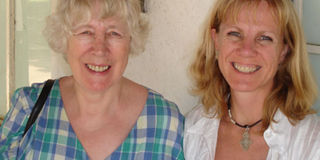A love for childcare and her birthplace, Karamoja

Joy with her mother standing outside the operation theatre at Moroto Hospital. Courtesy photo.
You cannot miss Professor Joy Lawn’s bubbly nature. She is a woman of high spirits and a smile that melts hearts. It was fascinating to hear her talking about her roots in Karamoja. She gave the narration with such delight.
We met during the three-day National Maternal and New Born Health conference at Kampala Serena Hotel where she was one of the participants. She is a maternal and child health advocate from the London School of Hygiene and Tropical Medicine.
Professor Lawn was born in Moroto hospital 50 years ago to Brian and Norma Herd, both of Irish origin.
“My mother once told me that she gave birth to me under very tough conditions. There was no running water or electricity in the hospital and she was having obstructed labour (where a baby is having difficulty to pass through the birth canal),” she narrates. “There was no medical personnel to attend to her.”
The total stranger who came the next day and birthed Lawn by C-section is the one mother and daughter owe their lives to. “I’m lucky to be alive today. Who knows what would have happened if my mother had not been helped?”
Her parents had two more children in Karamoja. Her mother is now 81 years old while her father is 84 years old.
Life as a teenager in Karamoja
During her tender years, Lawn remembers life in Karamoja as simple. “There was no sugar, no salt or other kind of luxuries,” she recounts. She recalls walking around different villages and making a good number of friends. “They were free and open with us. They took us like their very own,” she says.
Unlike her parents who were fluent in the Karamojong language, Lawn says she struggled speaking it. “I only knew few words and sentences.”
A teacher, her mother homeschooled them and taught at a teacher training college in Moroto. Her father was a missionary.
He was part of a group that included the then Church of Uganda Archbishop, Janani Luwum who wrote a letter condemning the killings that were being carried out by then President, Idi Amin.
“Someone was sent to kill my father because of his involvement in such affairs but he was able to escape from the country unhurt to the UK (United Kingdom),” she says.
Her two sisters and mother followed. Lawn, who was studying at St Andrews Turi School in Kenya at the time, went ahead and joined them too. “It was easier to cross over the border to go for studies in Kenya from time to time than travel to Kampala because the roads were very bad,” she says. Lawn was 13 years old when she moved to the UK.
Back in the United Kingdom
Life there was not any easier as Lawn says she was missing her home in Karamoja. “It took me a while to accept that I would not be in Karamoja for a while. I longed to go back but could not,” she says. Lawn decided to distract herself by focusing on her studies.
Right after high school, she enrolled for a degree in medicine at Nottingham University in the UK. She later worked in Ghana for four years focusing on pediatric care and newborn nursing care.
From Ghana, she worked for Centers for Disease Control and Prevention (CDC) in the United States of America (USA) for several years. While there, Lawn embarked on a Master’s degree programme in public health.
Her passion for childcareren
She later moved to the Institute of Child Health in London where she studied for her PHD. “I was able to research on information that brought attention to the death of new borns in the first days of life around the world,” she says. Lawn received her PHD about 10 years ago.
Growing up, Lawn says she could see children all around her suffering from illnesses they should not have been getting in the first place. “I really wanted to make a huge difference in the lives of such children,” she says.
During her time in Ghana, she also noticed there was attention being given child health issues but none specifically targeted to newborns, even though it is where the majority of child deaths were being registered.
“There were no guidelines for mothers, no nurses who knew what to do, and none of the funders or hospital administrators was interested in finding solutions to the problems,” she recalls.
Lawn had to spend about 10 years doing research including coming up with numbers and journal articles addressing these issues. And she has continuously been travelling from one country to another advocating for child and mother related health issues.
Love life
Lawn has been married for the past 25 years. She met her husband, Stephen Lawn, when he was working as a physician. They have two children together aged 17 and 20 years.
On what she found attractive about him, the mother of two says it was a common vision, which was to make a difference in the lives of the people who are least heard, especially those in Africa.
Lawn’s advice to women on career
“Find something you are passionate about and when you do, do it with all your might and strength. Learn not to listen to everything that people tell you, but rather follow your instinct instead.”




